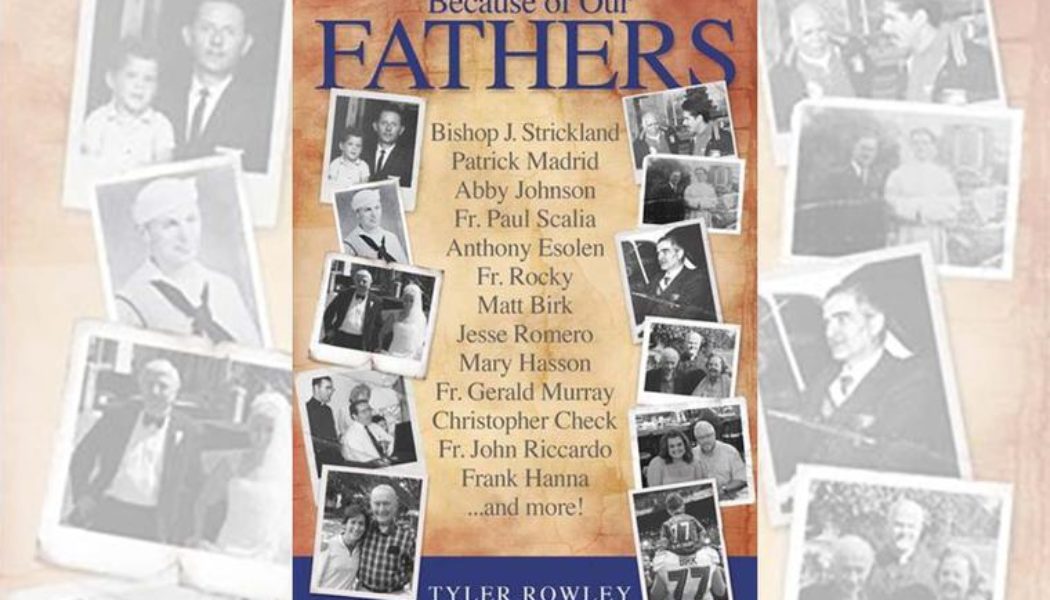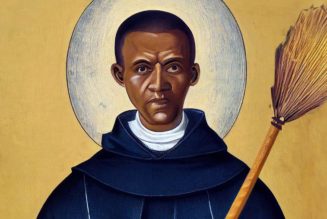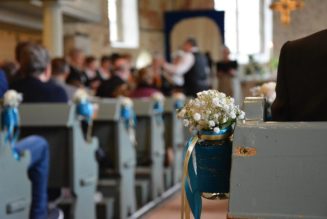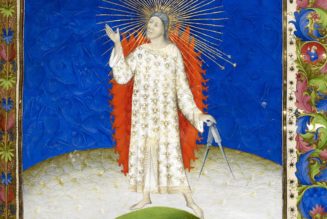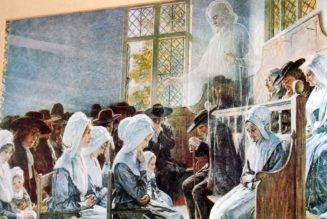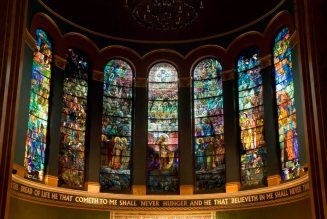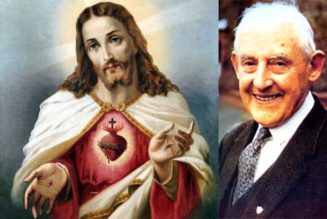
“The point of the book,” says the author of Because of Our Fathers, “is the same point the Church has been telling us for centuries: men are called to lead, protect and educate their children in a unique and primary way.”
In 1994, a team of Swiss researchers conducted a study on how faith is transmitted in the family, and their results were surprising. If a father does not go to church — even if the mother is deeply religious — the study showed only one child in 50 will become a regular worshipper. Whether a child will remain a Catholic, whether he will attend Sunday Mass and participate in the life of the Church, is significantly affected by the religious practice of the father.
Tyler Rowley’s own research confirmed the truth of the Swiss study. When Rowley heard a priest talking about how his own father had been influential in his vocation, Rowley was inspired to talk to other Catholic men and women from across the country about the role their fathers had played in the development of their faith. Again and again, he heard the same story: Fathers played a pivotal role in building a child’s love for Christ and His Church.
In Because of Our Fathers: Twenty-Three Catholics Tell How Their Fathers Led Them to Christ, Rowley brings together inspiring stories from well-known Catholic leaders whose fathers were instrumental in their faith journey. Rowley talked recently about the book, and about the poignant stories he heard from Catholics whose faith was strengthened and enriched by the example of their faithful fathers. “The point of the book,” he said,
“…is the same point the Church has been telling us for centuries: men are called to lead, protect and educate their children in a unique and primary way. The attacks our culture makes on masculinity and the family are intended to emasculate men and the Church as to usher in a new morality apart from Christ. The choice for men is now what it always has been — Christ or the world. May this book be a call to arms for all men to put in the armor of God and defend our children and Church.”
Your book contains stories of 23 Catholics’ relationships with their fathers. Some of the contributors are well-known, others are unfamiliar to us. What do these men and women have in common?
Their children admire them and want to be like them. They are first and foremost good men who love their wives and children and others. Their Catholicism makes them attractive to their sons and daughters, and the children eventually make the connection between the faith of their father and what it does to him.
Most common, it seems to me, is the father’s sacrificial nature. It is common in the book to hear the contributors talk about how their dads sacrificed money or prestige to be a better husband and father. They are masculine and are unashamed of their role as the leader of their families. This produces an order and peace in the home which gives children the clarity to understand the importance of God.
Most of them are prayerful and committed to the life of the Church in various degrees. Many of them attend Mass daily. Interestingly, but not surprisingly, almost all of them have a devotion to Mary.
You describe the people whose stories are told in this book as “spiritual mirrors of their fathers.” Can you elaborate on that?
I use this term in the book when describing the moment I reflected on all the people in my life and how I noticed that all of my fallen-away Catholic friends had fallen-away Catholic fathers, and all of my committed Catholic friends had fathers who took the faith seriously. It’s hard for me to think of one example among all of my family and friends that doesn’t repeat that pattern.
What if the father has changed? What if he did not live his faith while the children were small, then grew to accept Christ once they were in their teen years or beyond? Can he still influence his children for good? Or what if he was a devout Catholic, but then drifted away?
I think the heart of the matter is that young kids are impressionable and really love and depend on their fathers in those innocent days of their youth. Dad is the best and strongest guy in the world, and children have a natural tendency to follow his lead — first to gain his approval, but then to become like him. I don’t think the intensity of a father’s witness can be as strong later in life.
I noticed that many of the contributors are clergy: from Bishop Joseph Strickland, to Father John Riccardo, Father Gerard Murray, Father Rocky Hoffman Father Paul Scalia. How were these priests, who become fathers to us all, influenced by their fathers’ devotion?
These men were probably impacted the most by their fathers. In their homes, you do get a sense of an even deeper commitment and intentionality to the Faith than the others. Devotions like daily Mass and family Rosaries were more common in these families, and this makes sense, since the priesthood is the ultimate vocational sacrifice for a man. They also seem to come from larger Catholic families, so perhaps the accompaniment and experience of many brothers and sisters has an effect on one’s choosing religious life.
You have talked about John Castillo, whose heroic son Kendrick died trying to rescue his classmates in a May 2019 school shooting in Colorado. So fathers have an effect, not only on faith, but also on character — how that faith is exercised in the world. Can you talk more about that?
Kendrick saved his entire class from dying in a school shooting that day. Kendrick had an amazing Catholic father who deliberately handed on the Faith to him, as his grandfather did before him. The two shooters, conversely, had terrible father figures — almost non-existent in fact. I have no doubt that the characters of these three boys were formed by their fathers. The two shooters carried deep wounds of anger and regret from their fathers, and Kendrick carried the virtues of Christ instilled onto him by his father. You witnessed the clashing of these two worlds on that day.
Could you tell us about some of the contributors who have impressed you the most?
I think [Super Bowl champion] Matt Birk deserves special attention. Here’s a man who has everything the world has to offer. He had a long and successful career in the NFL. He has lots of money, fame and a world-class education from Harvard. Yet he has made Christ the center of all that he does.
Frank Hanna falls into that category as well — a very successful businessman who has remained humble and committed to the Church.
Father Jerome Karcher is the son of Carl Karcher, the founder of the famous fast food chain, Carl’s Jr. Conceivably, he could have had a very lucrative and easy-going life as a layman, but he chose to be a priest.
The same could be said of Father John Riccardo, whose father was the chairman of Chrysler Corporation. People like that always inspire me so I want to mention those four.
You yourself have several young children. What do you do as a parent to encourage them in the practice of their faith?
One thing that I want to mention here — I constantly talk about sacrifice.
Because of Our Fathers (Ignatius Press, 2020) is an inspiring Father’s Day read, or an encouragement to fathers and families any time.
Join Our Telegram Group : Salvation & Prosperity
